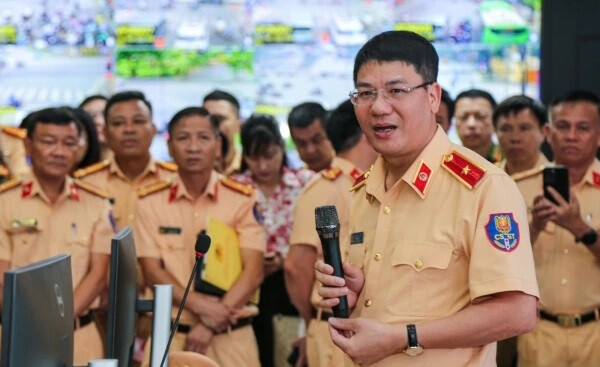
HANOI — The Traffic Police Department, under Vietnam's Ministry of Public Security, has announced a complete digital transformation of the transport system. At a press conference held in Hanoi on July 26, Major General Đỗ Thanh Bình, Director of the Traffic Police Department, stated, "In the future, citizens will be able to participate in traffic with just a single ID card (ca˘ncướcco^ngda^n)." This will be fully implemented after the Traffic Police Department completes a project to build 35 data centers to integrate information from various ministries and agencies.
The core of this project is data linkage. The Traffic Police Department will connect all traffic-related data—such as drivers' health records, tax payment history, customs information, and vehicle transport business licenses—into one integrated system. Once the system is operational, all data, including vehicle registration, ownership transfers, and vehicle origin and quality information, will be digitized and stored in a database. Major General Bình emphasized, "No agency will be able to demand paper documents from citizens anymore."
This digital transformation is also expected to have the side effect of eradicating forged documents. With licenses, registration papers, and insurance certificates, which were previously verified through physical documents, now being verifiable simply by searching a database, illegal activities involving forged documents are expected to be fundamentally blocked.
Meanwhile, for citizens who do not have their physical ID card, the Vietnamese electronic ID (VNeID) app was presented as an alternative. However, the traffic police recommend carrying the physical ID card in case a mobile phone is unusable during an accident. The ID card is the fastest means of identification in an emergency.
In addition, as part of the industrial digitalization, the Traffic Police Department is piloting an AI-based traffic monitoring and violation processing center in Hanoi. This center serves as a central control hub, connecting all surveillance cameras and small regional centers installed on roads nationwide. This 'Command Information Center' operates on a 24-hour, three-shift basis, with the goal of having AI and police officers collaborate to detect violations and send out violation notices within two hours. Vietnam's transport system is opening a new era, becoming more efficient and transparent through advanced technology.
[Copyright (c) Global Economic Times. All Rights Reserved.]






























